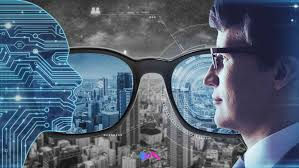El metaverso y su impacto futuro: ¿Es solo una moda pasajera o una revolución que cambiará la forma en que interactuamos?
- visionempresarial
- May 14, 2025
- 5 min read
Por: Lorena Meeser

Más allá del hype: el metaverso y la transformación silenciosa de nuestra realidad
En los últimos años, el metaverso ha aparecido en titulares de noticias, ferias tecnológicas y discusiones de sobremesa. Para algunos, representa el futuro inevitable de la interacción humana. Para otros, es una moda exagerada por el marketing y por Silicon Valley. Pero, ¿qué es realmente el metaverso y qué lugar ocupará en nuestras vidas dentro de diez años?

Una promesa digital multifacética
El metaverso no es un concepto nuevo. Su nombre nació en la novela de ciencia ficción Snow Crash de Neal Stephenson en 1992, en donde las personas utilizaban dispositivos y lentes especiales que los transportaban a un mundo virtual, tridimensional e inmersivo en el cual podían interactuar y compartir información, como si estuvieran presentes.
Pero no se trata únicamente de jugar videojuegos o chatear con personas virtuales, el metaverso podría transformar muchas áreas desde como aprendemos, como trabajamos desde casa, como viajamos, la manera de hacer negocios y diferentes maneras de tener atención médica.

El origen tecnológico de los mundos virtuales
Se remonta a 1978, cuando Richard Bartle creó MUD, un juego con muchos jugadores en tiempo real, considerado en la actualidad como el primer ejemplo de un mundo virtual. Posteriormente, en 2003, se lanzó Second Life, la plataforma pionera multimedia en linea donde los usuarios podían hacer un avatar y desarrollar una segunda vida en una comunidad virtual, mucho antes de que Mark Zuckerberg creara Facebook.
Desde entonces, se ha usado de diferentes maneras. En 2017, el videojuego Fortnite creado por Epic Games, comenzó a explorar la interacción entre personas y la tecnología ampliando el concepto de un «sólo» juego para incluir reuniones sociales con usuarios de muchas partes del mundo.
Steven Spielberg popularizó en 2018 la idea del multiverso en la adaptación cinematográfica de Ready Player One, una novela de ciencia ficción del escritor estadounidense Ernest Cline, que sirvió para establecer las bases sobre cómo nos imaginamos el Metaverso.

Entre la realidad y la especulación
Actualmente, los avances tecnológicos aun se están ajustando. Los lentes de realidad virtual son más ligeros y accesibles, pero pueden ser incómodas si se usan durante mucho tiempo. Las plataformas digitales tienen como objetivo crear áreas duraderas y conectadas, pero todavía están muy fragmentadas y no ha aumentado el número de usuarios al ritmo que muchas empresas esperaban.
Sin embargo, detrás de esa aparente calma, se están llevando a cabo cambios profundas. Empresas como Microsoft, Meta y Nvidia han invertido miles de millones de dólares en desarrollar infraestructura digital que no solo soporte el metaverso, sino que lo convierta en una extensión natural de nuestras vidas. La inteligencia artificial, la computación espacial y las redes 5G están convirtiendo la ciencia ficción en realidad.

¿Qué pasa si ya estamos adentro?
Lo curioso es que, sin darnos cuenta, ya habitamos el proto-metaverso. La gente pasa mucho tiempo en plataformas como Zoom, Roblox o Fortnite para crear versiones digitales de si mismos, asistir a reuniones de trabajo, tomar clases, presenciar conciertos virtuales y jugar video juegos. Los jóvenes de hoy, están acostumbrados a combinar el mundo real con el mundo virtual.
El trabajo remoto, provocado por la pandemia, también ha cambiado las reglas del juego. La necesidad de espacios de trabajo en equipo ha ido sentando las bases del “metaverso”.

El futuro, entretejido con preguntas
Pero toda gran promesa tecnológica viene acompañada de grandes interrogantes: ¿Qué pasará con la privacidad? ¿Quién regulará estos espacios? ¿Podrá el metaverso ser inclusivo o se convertirá en un lujo para pocos? Y lo más importante: ¿Tenemos el marco ético para vivir una parte significativa de nuestra existencia en realidades virtuales?

¿El metaverso es solo una tendencia o es el próximo gran salto al mundo digital?
El metaverso todavía no se ha consolidado. Pero descartarlo como una tendencia significaría ignorar el modo en que la tecnología moldea nuestras costumbres, sin darnos cuenta. Lo más probable es que no haya un "Momento Metaverso" claro y definido, sino una transición progresiva, silenciosa y constante hacia nuevas formas de interacción.
El reto no será solo tecnológico, sino también humano: diseñar espacios digitales que amplíen nuestras posibilidades sin desconectarnos de lo esencial. Finalmente, el objetivo no es no reemplazar la realidad, sino de mejorarla.

Beyond the Hype: The Metaverse and the quiet transformation of our reality
The Metaverse and its future impact: Fleeting trend or a revolution reshaping? How do we interact?
Beyond the Hype: The metaverse and the silent transformation of our reality
In recent years, the metaverse has dominated headlines, tech expos, and everyday discussions. For some people, it represents the inevitable future of human interaction. For others, it is an overhyped trend fueled by marketing and Silicon Valley buzz. But what exactly is the metaverse, and what role will it occupy in our lives within the next decade?
A Multi-Layered Digital Promise
The metaverse is not a new concept. Its name was coined in Neal Stephenson's 1992 science novel Snow Crash, but its essence has been present in a virtual world, such as Second Life, long before Mark Zuckerberg created Facebook.
The metaverse is a three-dimensional and immersive digital environment where people use devices and special goggles to enter a virtual, three-dimensional, immersive world in which they can interact and share information as if they were physically present.
But it’s not just about gaming or chatting with digital avatars. The metaverse has the potential to transform many aspects of life — from how we learn and work remotely, to how we travel, do business, and even access healthcare.

Between reality and speculation
Currently, technological advancements are still calibrating. Virtual reality glasses are becoming lighter and more accessible, but they remain uncomfortable for prolonged use. Digital platforms are trying to create persistent and connected spaces, but they are still highly fragmented. And most crucially, the user base has not grown at the pace many companies anticipated.
Nevertheless, profound transformations are brewing beneath this apparent calm. Companies like Microsoft, Meta, and Nvidia have invested billions of dollars in developing digital infrastructure that not only supports the metaverse but also turns it into a natural extension of our lives. Artificial intelligence, spatial computing, and 5G networks are making possible what seemed like science fiction just a few years ago.

What if we are already inside?
The curious thing is that, without realizing it, we already inhabit proto-metaverses. We spend hours on platforms like Zoom, Roblox, or Fortnite creating digital versions of ourselves, attending concerts, classes, or meetings. Younger generations, especially, have normalized this fusion between the physical and the virtual.
Remote work, driven by the pandemic, has also reshaped the rules of the game. The need for more immersive collaborative environments has opened the door to solutions that, while not "the metaverse" in its full definition, are laying the groundwork.
The future, intertwined with questions
But every major technological promise has significant questions: What will happen to privacy? Who will regulate these spaces? Will the metaverse be inclusive, or will it become a luxury for the few? And most importantly, do we have the ethical framework to live a significant part of our lives in virtual realities

Is the Metaverse just a trend or the next great leap into the digital world?
The metaverse is not yet fully realized. But to dismiss it as a passing trend would be to ignore how technology often reshapes our habits — quietly, and often without us noticing. It's unlikely there will be a single, definitive “Metaverse Moment.” More probable is a gradual, silent, and steady transition toward new modes of interaction.
The challenge will not only be technological, but human: to design digital spaces that expand our potential without disconnecting us from what truly matters. In the end, the goal is not to replace reality, but to enhance it.
.png)














































Comments